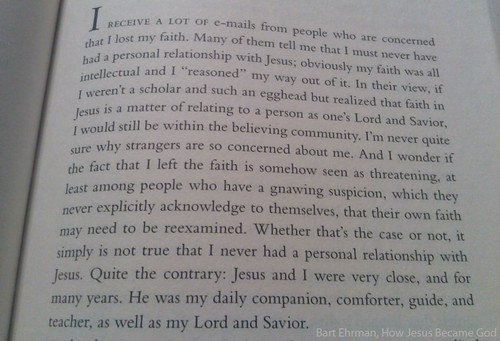Once upon a time, my Papaw and Mamaw took me to their Assembly of God church’s production of
Heaven’s Gates Hell’s Flames©. This is a play that Christian production companies take on tour to churches all over the world, using the members of the local congregations as the actors, which tells the stories of various people in their last moments of life and their subsequent first moments of eternity. Will they end up at Heaven’s Gates or will they succumb to Hell’s Flames?
The good people, and perhaps one bad person who at the end of his life begged for salvation, all met a meek, white-robbed, shaggy- haired Jesus who graciously and lovingly drew them to the shining bright light on Stage Left where they would spend eternity in peace, comfort and eternal bliss. The bad people, however, and maybe one person who “thought” he was good, were dragged kicking and screaming by demons to the red satin streamers flapping onto the stage by the fan of the flickering red lights of Hell’s Flames, Stage Right. The moral of the story: You never know when your last moment will be (car crash, falling to your death from work scaffolding, gunshot, or if you’re simply lucky, old age), so get prepared now. Ask Jesus into your heart now (there will be an altar call at the end of this production to assist you as you make your lifelong commitment now) or risk dying on the way home and being dragged to your eternal doom by the scariest red Spandex-wearing, black goatee-sporting Satan you could ever imagine.
At the end of that production, when the pastor asked the non-believers in the crowd to raise their hands to be saved – and requested the rest of the audience bow their heads so they wouldn’t see whose hands were raised – I nervously lifted my hand. I had already asked Jesus into my heart a couple of times before, but now I had to be sure, doubly sure, triply sure that I was saved, just in case. I did not want to be dragged Stage Right. I was terrified of being dragged Stage Right, for all of forever, never to be released. My Mamaw next to me gently tugged my arm back down. I was so confused. Was she ashamed that I wasn’t already saved? I was afraid of disappointing her so I put my hand down and stayed in my seat. I remembered that I could just as easily get saved from my seat as from the altar, so there in my chair, I begged God to please save me from going to hell, but I was still afraid that by not actually getting out of my seat and going forward, that my pride had kept me from actually being heard by God.
I was eight years old.
 |
| Image courtesy of Photorack.net |
“There is no fear in love. But perfect love drives out fear, because fear has to do with punishment. The one who fears is not made perfect in love.” (
1 John 4:18, NIV) This is what we are taught. We are told that it is God’s love that draws us to him, not fear. Yet at the very end of it all, the threat of hell dangles ahead of us, always warning us, always keeping us in check. When we doubt our faith, when we doubt God, when we are tempted to do wrong or go our own way, images of hell flicker in our minds. Eternal separation from God, misery, agony, death that never lets you die, the arrogant, maniacal laughter of Satan – though he too is burning – drives us from taking steps too far from God. The closer we tiptoe to the edge, the more real hell becomes. The flames lick our feet, the smoke singes our hair, and we run full force back into the arms of Jesus. Once we are there, we claim it was Jesus’ love that brought us back, but really, it was the proximity to hell that drove us home.
Fear is a motivator. Parents, teachers, police officers, judges and madmen use it all the time.
Do that again and you’ll get a spanking.
Study harder or you will fail.
Break the law and you will go to prison.
Use protection or you will get pregnant or an STD.
If you ever turn gay, boy, I will beat your ass.
Scream, bitch, and I’ll kill you.
Consequences are directly linked to fear, for better or for worse, and we use consequences and fear constantly to assure cooperation. Some consequences are logical, natural consequences: throw that toy out of anger and it will break, rob that liquor store and you will get arrested, cheat on your spouse and you could lose your marriage. Others, however, are illogical and unnatural:
hit your sister and you will get spanked (e.g., hit by me),
forget your homework once and fail the class,
talk back to an officer and get shot. Fear is a factor anytime consequences are considered, and some fear is helpful in making positive decisions. But when fear is taken to an unnatural extreme, it can be abused as manipulation.
I know already what the Christian wants to say: “But hell IS a natural, real consequence, and the worst consequence, and it would be wrong of us not to warn you!” Putting aside, for just a moment, the fact that there is no actual evidence that hell is a real, natural consequence other than an ancient book sort of, kind of, if you read it a certain way, says so, I have to wonder just what kind of all loving, Heavenly Father would actually choose eternal torture as a reasonable punishment.
Parents discipline their kids in various ways. Time-outs, loss of privileges, rectification, smacks. The purpose of discipline is supposed to be character building. We teach children about natural consequences so they will understand how to make better decisions in the future. We explain right from wrong. We try to show them how wrong decisions affect and hurt others, and why right decisions are always right, even when they are hard. We fill our box of parenting tools with the tools we believe will be best suited to these purposes. In general, we all try to do our best to reach the same common goal of bringing up children who are good. This is what God the Father is supposed to be doing too. Teaching us lessons that will make us stronger, better, more righteous people.
When we hear of parents who have beat their children to a pulp or who have kicked their children onto the streets, very few of us agree these parents have done right. A boy who is beaten by his father for being gay or the girl who is kicked out on the streets for getting pregnant are examples to us all of how not to parent our kids. Yet even in the worst possible way, those parents are in some dim, misguided, heartless way trying to teach their kids a lesson. Trying to “improve” them, in most cruel and irrational ways. These are what we call “bad parents”. Yet when we look at hell, we see something crueller than even that.
We see a loving Heavenly Father who gives his children hardships to strengthen them, who allows horrible things to happen to them to bring them even closer to him. Abusive relationship parallels aside, the most innocent and well-intentioned view of this is that God just wants us to be the best we can be, making us more like his Son Jesus, which is the goal. But that is only one side of him. The other side looks at those who are not his children (even though they are his creation) with total disregard, or worse, with vengeance. He gives salvation freely but not to these people. And for his creation that he disregarded, he has a plan for ultimate punishment – eternal torture in a fiery furnace of misery, agony, complete separation from all good things like love and companionship and holiness, forever and ever and ever with no chance for redemption.
No chance of redemption. No chance to learn from their mistakes and become better.
Even the worst parent who beats his child does it with some kind of sick belief it will do the child some good.
Unless God the Father is like the father who beats his child for his own sick pleasure and nothing else, God is no Father at all. The God of the Bible that Christians taut as all-loving, who Christians insist to your face
loves you has designed a place for you where you will suffer for eternity for absolutely no reason other than not believing in him. He withholds his grace from you (remember, faith is a gift that only God can give) and will punish you for it. Unless you want to spend your eternal afterlife in this miserable place, you better get yourself right with this all-loving, all-compassionate Heavenly Father who has the power to make you burn. Fear of hell is the ultimate motivator.
A few weeks ago I went back to see a production of
Heaven’s Gates Hell’s Flames©; I wanted to know if it was really as frightening as I remembered. It was. Everything was exactly as I remembered it, except Satan wasn’t wearing red Spandex as he did in my mind’s eye, but instead a black cloak, a menacing white and black mask with evil facial features and had reverb in his loud, booming voice. Hell was still Stage Right, with smoke and satin flames and flickering red lights. He still dragged both bad and good (though all of course always
pre-warned, because that’s how the world really works) people into his lair, begging and screaming their bloodcurdling pleas for forgiveness all too late. Even as a thirty-something year old post-Christian, I watched in horror, as my chest tightened with memories of that childhood terror, the childhood dreams of demons dragging me to hell, the fear I was never really saved and would one day die to hear my supposed Savior shout, “Depart from me, I never knew you!” Unchecked, I myself would’ve been swayed by the naked fear it instilled in me; that primal fear of hell may never go away.
It was a sad realization. The trauma we go through as children will always be with us. It will always be there, hidden in somewhere in our psyches, long after rationalization and logic take over our conscious thoughts.
There were several children in the audience, some who looked too young to even be in school. To their credit, the production staff did warn at the start that the program was not suitable for children under ten and encouraged parents to send their kids to a children’s program located elsewhere in the building. Many kids went to that, but many stayed. I wondered how many parents who kept their kids with them had actually seen the play themselves previously. I wondered if they had, if they would still insist on keeping their children in to watch teen suicides, domestic violence, murders, car and plane crashes, school shootings and of course the Devil Himself unfold right before their baby eyes.
My heart ached when I saw a tiny little girl, no older than six, lift her own skinny arm at the altar call at the end, seeing myself in her tiny blond bob, seeing her future before her, one of fear, even if also mixed with love. Fear will be with her as she grows into a woman.
After the final scene, where a screaming unsaved mother is dragged away from her screaming, begging Christian teenage daughter by the billowy, echoey hooded Satan and his demons at the gates of heaven, and the girl is hugged by Jesus then sent on her own to enter the pearly gates looking forlorn but okay, the production director came on stage and began the obligatory altar call. At first, he asked that all would bow their heads and close their eyes, just as the director did twenty-five years ago. He asked that anyone who wanted to invite Jesus into their lives slip a hand in the air. He then asked them to stand, and anyone else who was too afraid to lift their hands the first time to also stand. Then he requested that all the backslidden Christians also stand. Even with my head bowed, I could sense all the bodies around me standing. He then invited them to come forward to the altar at the front. Bodies filed past me, many crying, many looking guilt-ridden, a few looking relieved. As the director kept insisting there were more backsliders who hadn’t yet come forward, and more “backsliders” filed past me to the front, I felt the same familiar rage build inside of me.
These are good people! You are all good people! I wanted to scream. I was burdened and angry at the guilt heaped upon guilt being laid on thick on all the spiritual masochists in the room – and all the normal people too – who were all searching their hearts and determining that he – no, God – was speaking to them. I waited. I wanted to stay to the end if I could.
Then he said, “Christians, I want you to turn to the person next to you, even if you don’t know them. Maybe put your arm around them. I want you to ask them, ‘Do you know Jesus Christ as your personal Lord and Savior?’"
I couldn’t take any more.
Before the sweet looking teenager next to me whose friend had just gone forward could turn to me, I turned to the aisle and marched not forward to the altar but backwards to the back of the room and out the back door. Eyes followed me, but I did not care. I had no intention of making a scene, but I’d seen and heard enough. Frustrated, I knew that many people interpreted that in their own Christianese as me hardening my heart to the Spirit, but it was far from being that. It was like having to leave a scene of abuse that you have no way of stopping. Like having to walk away from something that is so wrong and out of your control that you cannot bear witnessing it any longer. Like turning your head away from a car crash on the freeway instead of rubbernecking. I had seen enough of my past and these strangers’ futures to watch any longer. The anger bubbling up inside me was too explosive. I’m afraid of what I would’ve said to that sweet teen next to me. Afraid of what would have come out of my mouth. My purpose in life is not to insult other people’s sincerely held faiths. But it is also not my purpose to condone psychological abuse.
Luckily no one followed me outside, though I was worried someone might.
Reflecting later that night, one more sad realization struck me. Fear is the overarching theme of this play. The scenes of people going to hell dominate not only my recollections of last night, but my memories of the play from twenty-five years ago. I remembered so distinctly the damned being dragged to hell Stage Right. But how is it that I did not remember that the saved walked up a huge flight of stairs center stage to enter heaven through a shiny curtain at the top where they were greeted by Jesus? I realized, I only concluded that the Christians went to heaven Stage Left because actually, I couldn’t remember at all what happened to the saved. That was never the point of the play. How did I recall every detail of hell in the wings twenty-five years later but forgot that the entire stage was decorated in gold and silver, with sparkling steps running up the center, surrounded by angels who stood on stage the entire time, with a humble Jesus waiting at top, arms outstretched?
Jesus is not the point of this play, that’s why.
Jesus never speaks a word. Not one word throughout the whole production. He never makes a single active motion aside from hugs to the people who climb the steps towards him. In only one scene does he seem to intervene in a situation, the one in which a troubled teen commits (accidental) suicide. Both Jesus and Satan approach her silently, then Satan flees when she calls out to Christ. Even then, Jesus only stands there smiling gently. He does not actually do anything for her until she is in heaven and he silently wipes his hand across her arm, removing the scars from years of cutting, before sending her through the curtain.
Conversely, Satan has lots to say. In his booming, echoing voice, he taunts the sinners, laughs at the arrogant fools who thought being a good person was good enough, and then addresses the audience with one-liners about how he loves to watch anger
CONSUME people’s hearts and how pornography is his
SPECIALTY. Then he flaps back to hell with guffaws that echo through the room after blackout.
Jesus is entirely forgettable. I do not recall anything that Jesus did twenty-five years ago on that stage. But Satan was everything I remembered. It could have been the same actor, the memories are so exact.
“There is no fear in love. But perfect love drives out fear, because fear has to do with punishment. The one who fears is not made perfect in love.”














